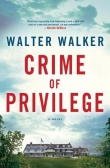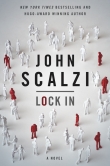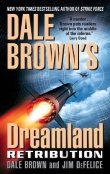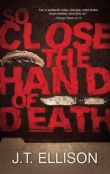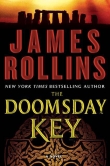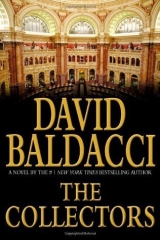
Текст книги "The Collectors"
Автор книги: David Baldacci
сообщить о нарушении
Текущая страница: 14 (всего у книги 27 страниц)
Chapter 33
“Regina Collins,” Annabelle said in a brisk manner, handing the woman her card. “I called ahead for an appointment with Mr. Keller.” She and Milton were standing in the reception area of Keller & Mahoney, Architects, located in a towering brownstone near the White House. She was dressed in a sleek black pantsuit that beautifully offset her now red–highlighted hair. Milton stood behind her, alternating between self–consciously adjusting his orange tie and fingering the chic ponytail that Annabelle had styled his long hair in.
A minute later a tall man in his fifties with wavy gray hair strode out to meet them. He wore a monogrammed striped shirt with the sleeves rolled up, and green braces held up his trousers. “Ms. Collins?” he said. They shook hands, and she handed him one of her business cards.
“Mr. Keller, what a pleasure. Thank you for taking the time to see us on such short notice. My assistant was supposed to call you before we left France. Suffice it to say, I’m getting a new assistant.” She indicated Milton. “My associate, Leslie Haynes.”
Milton managed to say both hello and shake the man’s hand, though he didn’t look very comfortable doing either.
“Forgive the jet lag,” Annabelle said quickly, noting his awkwardness. “We usually take the afternoon flight here, but it was booked. We had to get up before dawn Paris time. A real killer.”
“Not to worry, I can relate. Please, come on back,” Keller said amiably.
In his office they all sat at a small conference table.
“I know you’re a busy man, so I’ll get right to the point. As I said in my call, I’m the managing director with a start–up architectural magazine for the trade in Europe.”
Keller glanced at the business card that Annabelle had just had run off that morning. “La Balustrade. Clever name.”
“Thanks. The ad agency spent a lot of time and our money developing it. I’m sure you can understand that.”
Keller laughed. “Oh, yes. We went that route initially and then decided to just name the company after ourselves.”
“I wish we’d had that option.”
“But you’re not French?”
“An old story. I’m a transplanted American who fell in love with Paris while I was in college on an exchange program. I can speak the language just well enough to order dinner, a nice bottle of wine, and get into trouble on occasion.” She said a few words in French.
Keller laughed embarrassingly. “I’m afraid I don’t,” he said.
She opened a leather briefcase she’d brought with her and pulled out a notebook. “Well, for the inaugural issue we wanted to do a story on the renovation of the Jefferson Building that was undertaken by your firm in partnership with the Architect of the Capitol.”
Keller nodded. “That was a great honor for us.”
“And a long job. From 1984 until 1995, correct?”
“You’ve done your homework. That also included redoing the Adams Building across the street as well as cleaning and conservation of the murals in the Jefferson Building. I can tell you it dominated my life for ten years.”
“And you did a brilliant job. From what I understand it was a Herculean task simply to rework the main reading area. There were a lot of structural integrity issues, load–bearing column problems, particularly with the challenge of the dome, and I heard that the original truss work left a lot to be desired?” These were items Milton had pulled off the Internet for her just that morning. She’d distilled a hundred pages of information down so smoothly, and spun it out so glibly, that Milton looked at her in amazement.
“It did have its challenges, although you’re looking at a building that was constructed over a hundred years ago. Given that, they did a helluva job back then.”
“I have to say the regilding of the Torch of Learning’s flame at the apex of the dome with twenty–three–and–a–half–carat gold leaf was an inspired touch.”
“Well, I can’t take credit for that one, but it does look terrific against the roof’s copper patina.”
“But you can take credit for using modern technology and construction techniques to make the building even better,” she said.
“That we did. It’ll easily last another hundred years or more. And with a price tag of over eighty million, it should.”
“We won’t be allowed to take any pictures of the construction plans, will we?”
“I’m afraid not. Security issues and all that.”
“I completely understand, but I had to ask. Can we at least look at them? When we do write the story, I want to be able to give full flavor to all the incredible ingenuity that your firm brought to the project. And it might help you give us a better commentary if they’re in front of us. Our magazine will be distributed in eight countries. Not that your firm needs the exposure, but it couldn’t hurt.”
Keller smiled. “Well, it sounds like this article will be good for business. In fact, we’ve been looking to branch out overseas.”
“Then I think this is a match made in heaven,” Annabelle replied.
“Any particular phase you’d like to look at?”
“All of it, really, but perhaps a focus on the basement and the second floor, which I heard were challenges too.”
“It was all a challenge, Ms. Collins.”
“Please, call me Regina. And the reconfig of the HVAC?”
“That was a bear.”
“I can tell this is going to be a great article,” Annabelle cooed.
Keller picked up the phone, and minutes later they were looking over the architectural plans. Milton positioned himself such that he took in every inch of the drawings, mentally filing every detail away in far reaches of his brain that most human beings could not access in theirs. Keller went over various points while Annabelle quickly sized up the plans and directed his attention and comments to the basement fire suppression room, the HVAC and the Rare Books reading room vaults.
“Now, the fire suppression equipment is centrally housed and piped through the slab?” she asked, drawing a finger along this part of the plan.
“Exactly. We were able to centrally locate it because of the delivery system we had. But they’re in the process of changing the suppressant.”
“Halon 1301,” Milton volunteered, and Annabelle gave him a rewarding smile. “An ozone depletion monster. We have the same problem across the pond.”
“Precisely,” Keller agreed.
“And this HVAC duct runs right up to the vaults housed around the reading room,” she pointed out.
“Yes, that was a little tricky because of the limited space, but we piggybacked some of the principal ductwork right onto the shelving columns.”
“And still allow them to be load–bearing. That is very clever,” Annabelle complimented.
They went over the drawings for another half hour until Annabelle pronounced herself satisfied. “Leslie,” she said to Milton, “do you need to see anything else?”
He shook his head and, smiling, put his finger to his temple. “I’ve got it all up here.”
Annabelle laughed and Keller quickly joined in.
She took a photo of Keller and his partner, Mahoney, for the story, and promised to send them a copy of the magazine when it came out. Don’t hold your breath, guys.
As they were leaving, Keller said, “If you have any more questions, don’t hesitate to give us a call.”
“You’ve been more helpful than you could possibly imagine,” Annabelle replied truthfully.
As they climbed into Annabelle’s rented Ford, Milton said, “Thank God that’s over. My palms are so sweaty I could barely open the car door.”
“Milton, you did great. That halon comment was perfectly timed to put the mar – I mean, to put Keller at ease.”
“It actually did feel good. Even though I felt like throwing up a couple of times.”
“Forget about it; that comes with the territory. And you showed some style too with that ‘got it all up here’ comment.”
Milton beamed. “You liked that one? It just came out.”
“I can tell you’re a natural at this.”
He glanced at her. “You seem to do this stuff really well too.”
She put the car in gear. “Just beginner’s luck.”
Chapter 34
While Annabelle and Milton were meeting with the architects, Stone had ventured into the neighborhood where Bob Bradley had lived. He’d dressed in a floppy hat, oversize coat and baggy pants, and he had on a leash Goff, Caleb’s mongrel dog, which had been named after the first director of the Rare Books Division. This was a dodge that he’d used before, and had actually originated in his old job with the government. People just could not bring themselves to be suspicious about someone walking a pet. Stone had no idea, of course, that Roger Seagraves had used the same ploy in making his escape after killing Bradley.
As he strolled down the street, he could see that all that was left of the town house was a blackened mass of toppled studs and a scorched brick chimney. The two attached homes on either side of Bradley’s residence had also been extensively damaged. Stone looked around the area. It was not a particularly affluent part of town. Being a congressman was not the financial windfall that some people thought it was. Members had to maintain two residences, one in their home state and one in the capital city, and the cost of housing in D.C. was extraordinarily high. Some congressmen, particularly newer ones, often shared homes in Washington or even slept in their offices for this reason. Yet the veteran Bradley had lived alone.
Milton managed to get Stone background information on the man, and Stone had also consulted the journals kept at his hiding place. Together they had presented an overall picture of Bradley. Born in Kansas, he had had a typical politician’s career, if there was such a thing, serving twelve terms in the House and rising through the ranks to head up the House Intelligence Committee for over a decade before assuming the position of Speaker. With his death at age fifty–nine, he left behind a wife and two grown children, all back in Kansas. From what Stone could learn the man had been honest and his career never threatened by scandal. His stated purpose of cleaning up the Congress could very well have made him many powerful enemies and led to his death. Some might conclude that assassinating a man who was third in line to succeed the president would be too audacious a move. However, Stone knew that was a pipe dream: If one could kill presidents, nobody was safe.
Officially, Bradley’s murder was still an ongoing investigation, although the media, after a flurry of stories about it, had been uncharacteristically mum. Perhaps the police were starting to suspect that the terrorist group didn’t really exist and Bradley’s death was due to something far more complex than the work of bigoted and violent lunatics.
He stopped next to a tree so Goff could take a leak. Stone could sense the presence of authority all around him. He’d been in the spy business long enough to know that the truck parked at the far end of the street was a recon vehicle, the two men inside assigned to ferret out any helpful details by watching the dead man’s home. One of the nearby townhomes had probably been commandeered by the FBI with an investigative team working there 24/7. Binoculars and cameras were no doubt trained on him right now. He pulled his hat down a bit lower, as though in response to the breeze.
As he was looking around, he caught sight of something, immediately turned around and walked the other way, dragging Goff along in his haste. A white D.C. Public Works van had turned the corner and was heading his way. He did not intend to find out if it was a real public works van or full of people who specialized in causing other humans enormous pain.
He turned right at the next corner and prayed that the van didn’t follow. Although the area was crawling with feds, he could not assume that would protect him. The FBI might very well toss him in the van with the torturers and wave a hearty good–bye. He walked two more blocks before slowing down and letting Goff fuss at a bush while he slowly glanced behind him. No sign of the van. Yet it could’ve been a ruse, distracting him while they came at Stone from another direction. With this thought he called Reuben on his cell phone. The big man had just punched out at the loading dock.
“I’ll be there in five minutes, Oliver,” he said. “There’s a police substation two blocks from where you are. Start heading that way. If the bastards make a move, you start screaming like bloody murder.”
Stone walked in that direction. Reuben, for all his faults, was as loyal and as brave a friend as Stone could possibly want.
True to his word, Reuben came roaring down the road in his pickup truck, and Stone and Goff climbed in.
“Where’s your motorcycle?” Stone asked.
“Jerk–offs have seen it. Figured I’d keep it on the q.t.”
When they were far away from the area, Reuben slowed and then stopped.
“I’ve been checking the side mirror, Oliver,” he reported. “I didn’t see anything.”
Stone didn’t look convinced. “They must have seen me on the street.”
“Your disguise fooled them.”
Stone shook his head. “People like that aren’t fooled so easily.”
“Well, maybe they’re keeping you on a short leash, hoping you’ll lead them to the pot of gold.”
“I’m afraid it’ll be a long wait, then.”
“Meant to tell you, buddy of mine from the Pentagon called me back. He didn’t have a lot to say about Behan and that military contract, but he did tell me something interesting. I know some things have been reported in the press about secrets being stolen and leaks occurring. But it’s a lot worse than the papers have reported. From what my friend said, there’re some moles selling this country down the river to our enemies in the Middle East and Asia, among others.”
Stone fiddled with Goff’s leash and said, “Reuben, have your friends at D.C. Homicide or the FBI gotten back to you?”
“You know, that’s really strange. Not one of them has called back. I don’t get it.”
Oh, I get it, Stone thought. I get it loud and clear.
Chapter 35
They met at Stone’s cottage later that evening, and Annabelle and Milton reported on their session with the architects. Relying on his astonishing memory, Milton had drawn out a detailed plan of the locations of both the fire room and the HVAC line.
Caleb studied the drawings. “I know exactly where that is. I thought it was just a storage room.”
“Is it locked?” Stone asked.
“I suppose it might be.”
“I’m sure I have some keys that will probably fit it,” Stone said.
Caleb looked startled. “Keys? What’s that supposed to mean?”
“I think it means he’s planning on breaking into the room,” Annabelle said.
“Oliver, you can’t be serious. Against my better judgment I let you impersonate a German scholar to get into the vault, but I absolutely draw the line on burglarizing the Library of Congress.”
Annabelle looked at Stone with new respect. “You played a German scholar? That’s impressive.”
“Please do not encourage him,” Caleb snapped. “Oliver, I am a federal employee.”
“And have we ever held that against you?” Reuben quipped.
Stone said, “Caleb, if we don’t get into that room, all the risk in getting the plan details will have been for nothing.” He pointed at the drawing. “And you can see that the HVAC line running to the vault is also located in the fire suppression room. We can check both out at the same time.”
Caleb shook his head. “That room is located off the main basement corridor. There are usually lots of people walking along there. We’ll get caught.”
“If we act like we’re supposed to be there, no one will challenge us.”
“He’s right, Caleb,” Annabelle said.
“I’m going too,” Reuben added. “I’m tired of being left out of all the fun.”
Milton piped in, “What about us?”
“I can’t walk in with an army of people,” Caleb wailed.
Annabelle said, “We can be backup, Milton. Every plan needs to allow for contingencies.”
Stone looked at her strangely. “Fine, you can be our backup. We’ll go tonight.”
“Tonight!” Caleb exclaimed. “I’ll need at least a week to work up the nerve. I’m a wimp. I started out as a librarian at an elementary school, but I couldn’t take the pressure.”
“You can do it, Caleb,” Milton advised. “I felt the same way today, but it’s not that hard to fool people. If I can do it to some architects, you can do it at the place where you work. What could they possibly ask you that you wouldn’t have an answer for?”
“Oh, I don’t know, how about where’s my brain for agreeing to do this in the first place?” Caleb shot back. “And besides, the building will be closing by the time we get there.”
“Can you still get us in with your library badge?”
“I don’t know. Maybe, maybe not,” he said evasively.
“Caleb,” Stone said calmly. “We have to do this.”
Caleb sighed. “I know. I know.” He added sharply, “At least allow me the satisfaction of pretending I’m putting up a fight.”
Annabelle put a hand on his shoulder and smiled. “Caleb, you remind me of somebody I know. His name’s Leo. He likes to bitch and moan and act like a weenie, but in the end he always comes through.”
“I guess I’ll take that as a compliment,” Caleb said stiffly.
Stone cleared his throat and opened one of the journals he’d brought with him. “I think I’ve discovered at least partly what it is we’re up against.”
They all turned their attention to him. Before he started speaking, he switched on his portable radio and classical music filtered into the room. “Just in case the cottage is being bugged,” he explained. He cleared his throat again and told them about his trip to Bradley’s destroyed house. “They killed the man and blew up his house. At first I thought it was to keep up the terrorist group subterfuge. Now I think there could be another reason: namely, that in spite of his reputation as an honest man, Bob Bradley was corrupt. And the evidence of that corruption disappeared in the explosion.”
“That’s not possible,” Caleb said. “His predecessor was a crook, not Bradley. They elevated Bradley to the top spot to clean things up.”
Stone shook his head. “In my experience in Washington one does not capture the Speaker’s chair on an agenda of anticorruption. One gets there by building up powerful support and cultivating alliances over the years. Still, Bradley’s ascension was out of the ordinary. If the majority leader hadn’t been indicted along with the former Speaker, the job would’ve gone to him. And after him the party whip. But the leadership was so tainted that Bradley was brought in like the proverbial out–of–town sheriff to clean up the town. But I’m not talking about that sort of corruption.”
“Bradley’s role as Speaker obscures the other significant title he held: that of chairman of the House Intelligence Committee. In that role Bradley would have been briefed on virtually every covert operation going on in every American intelligence agency, including the CIA, NSA and the Pentagon. He and his staff would have been privy to secrets and classified documents worth a great deal to our enemies.” Stone leafed through his journal. “Over the last several years there have been numerous accounts of espionage against American intelligence agencies, some of which have resulted in the deaths of undercover agents, four in the most recent instance that the press identified as State Department liaisons. And according to Reuben’s sources, it’s even worse than the media have reported.”
“So you’re saying Bradley was a spy?” Milton asked.
“I’m saying it’s a possibility.”
Caleb said, “But if Bradley was working with America’s enemies, why would they kill him?”
“There are two possibilities,” Stone replied. “First, he might have asked for more money in return for his acts of treason, and they decided to kill him instead. Or —”
Annabelle said, “Or we killed him.”
Stone glanced at her and nodded slightly. The others looked stunned.
Caleb exclaimed, “We? As in our government!”
“Why kill him? Why not bring him to justice?” Milton added.
“Because doing that entails it all coming out,” Stone said.
“And maybe the CIA and Pentagon don’t want people to know they were beaten by the other side,” Reuben added.
“And the CIA is not known for its compassion,” Stone added dryly. “Even the Speaker of the House may not be immune from their target sheet.”
“But if it is our own government behind this, who were the people who kidnapped and tortured you, Oliver?” Milton asked.
Annabelle shot him a glance. “You were tortured?”
“I was interrogated thoroughly by some very experienced people,” Stone replied.
“Thoroughly interrogated? They tried to drown you,” Caleb snapped. “By … water–dunking you.”
Reuben slapped his leg in fury. “Water–dunking! For God sakes, Caleb, that’s what they do to clowns at the fair. What they did to Oliver was water–boarding, and it sure as hell ain’t the same thing.”
Stone said, “To address your question, Milton, I don’t know how my abductors play into this yet. It doesn’t make sense that if our government killed Bradley, they would also be interested in what we’ve found out. They’d already know.”
“It would make sense if the agency that killed Bradley did the deed on its own, and another agency is trying to play catch–up,” Annabelle offered. “We may have one agency pitted against another.”
Stone looked at her with even more respect. “That’s an interesting theory. How it plays out for us is hard to say right now.”
“Are you still thinking this is tied to Jonathan’s death?” Annabelle asked.
“The common denominator all along has been Cornelius Behan,” Stone said. “His appearance at the library and his interest in the fire suppressant system only makes our suspicions seem more well founded. That’s the tie to Jonathan. Cornelius Behan. And to get to the bottom of that, we have to find out how Jonathan died.”
“So we have to burglarize the Library of Congress,” Caleb groaned.
Stone put a hand on his friend’s shoulder. “If it makes you feel any better, Caleb, it’s not the first government building I’ve broken into.”
